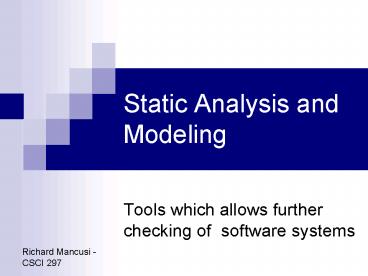Static Analysis and Modeling - PowerPoint PPT Presentation
Title:
Static Analysis and Modeling
Description:
Dawson Engler, Benjamin Chelf, Andy Chou, and Seth Hallem. ... Unreclaimed memory checks 'Double free' instances checks. Use after deallocation checks ... – PowerPoint PPT presentation
Number of Views:37
Avg rating:3.0/5.0
Title: Static Analysis and Modeling
1
Static Analysis and Modeling
- Tools which allows further checking of software
systems
2
- Dawson Engler, Benjamin Chelf, Andy Chou, and
Seth Hallem. Checking System Rules Using
System-Specific, Programmer-Written Compiler
Extensions. OSDI 2000 - Madanlal Musuvathi, David Y.W. Park, Andy Chou,
Dawson R. Engler, David L. Dill. CMC A pragmatic
approach to model checking real code. ISCA 2001.
3
Issues
- Programming tools find (simple) static errors
not useful for semantic errors. - Brunt force testing methodologies are not
effective nor thorough when considering larger,
more complex software systems. - The amount of effort towards identifying issues
increases (exponentially?) as time moves onward.
4
More Issues
- We really are not good at programming.
- The psychology of the master programmer
- Etc. (There are as many excuses for the
incorrect as there are programmers.) - Software cannot be verified. The best we can
hope for are sophisticate checks to unfold (more
of) the errors in our code.
5
Meta Compilation
- System implementers understand the semantics of
the system better. - Compilers are better enforcers of rules that map
well to the source code. - Therefore MC involves integrating user provided
systemic (semantic) rules to the compilation
process.
6
MC Extensions
- Uses Metal, a language for expressing a broad
class of customized, static, bug-finding
analyses. - xgcc, the analysis engine searches all execution
path and applies extensions - Local analysis
7
Example
- sm free_checker
- state decl any_ptr p
- start free(p) gt p.freed
- p.freed p gt p.stop,
- err(using s after free!,
mc_identifier(p)) - free(p) gt p.stop,
- err(double free of s!,
mc_identifier(p)) - From
- Seth Hallem, Benjamin Chelf, Yichen Xie, and
Dawson Engler. - A System and Language for Building
System-Specific Static Analyses. PLDI 2002
8
Rule Templates
9
Memory Management
- Check against null pointers
- Unreclaimed memory checks
- Double free instances checks
- Use after deallocation checks
10
Global Checks Extension
- The authors suggest useful checks performed on
the whole code input - Kernel code should not call blocking functions
when holding a spin lock. (42/4) - Library modules should not call blocking
functions until after the reference count is set
properly. (53/2)
11
Other uses
- Detection of race conditions and deadlocks
- RacerX effective, static detection of race
conditions and deadlocks, Dawson Engler and Ken
Ashcraft, In Proceedings of the Symposium on
Operating Systems Principles, pages 237-253,
October 2003
12
Transitioning
- Any questions?
- (yawns?)
13
Conventional Model Checking
- Modeling software is difficult at best, requiring
abstract definition of software system. - Abstraction tends to minimize details of
implementation. - Time consuming, manual process.
- Memory intensive, usually exhausting system
resources.
14
CMC C Model Checker
- Integrates with the code implementation
- Process state includes global and local
variables, heap, stack, and registers as well as
shared memory - Optimizations to avoid unnecessary state
explosion problem - Non-deterministic modeling supported
- Can benefit on successive systems
15
CMC Steps
- Correctness properties
- Environment specification
- Identify Initialization code and event handlers
- Initial state generated using init functions
- State generation
- Correctness checks during model execution
16
State Space Explosion
- Key to prolonging model execution
- State caching to prevent reintroductions
- Hash compaction (store small signature to
represent each state) - Balance missing few errors in exchange to
reducing state space - Down-scale model parameterizations
- Heuristics to remove uninteresting states
17
The AODV Model
- Use of interrupt driven event handlers fits well
into the CMC modeling paradigm - 3 different implementations of routing protocol
modeled - 34 distinct errors discovered, including one
specification bug - (Mostly) shared modeling code
18
AODV Correctness Properties
- General assertions (segmentation faults, memory
leaks, dangling pointers) - All routing tables contain no loops
- Routing table entries (a) one per node, (b) no
route to self, valid hop count - Messages have valid hop counts (cant be
infinity), and reserved fields are zeroed.
19
AODV Environment
- Uses unordered message queue
- Message loss modeled with random queue deletions
- Alternate wrapper function provide to send
network packets - Stubs for 22 kernel functions and user-spaced
socket buffer library
20
AODV Initialization and Event Handling
- The initialization code is clearly identified
- Every signal handler mapped to a CMC transition
21
Example
- 1 int c
- 2 mutex_t m
- 3
- 4 void Odd() lock(m) if ((c2) 1)
printf(odd d\n, c) unlock(m) - 5 void Even() lock(m) if ((c2) 0)
printf(even d\n, c) unlock(m) - 6
- 7 int main()
- 8
- 9 c 0
- 10 init_mutex(m)
- 11 schedule(Odd)
- 12 schedule(Even)
- 13
- 14 wait(5)
- 15
22
Conclusions
- Static analysis tools are available which provide
rules-based checking of code - Modeling can be used to identify more bugs under
controlled executions with programs which fit
the framework well. - Finding bugs is easy, given the right approach
- The search for better means to validate
software should continue more lessons to come































